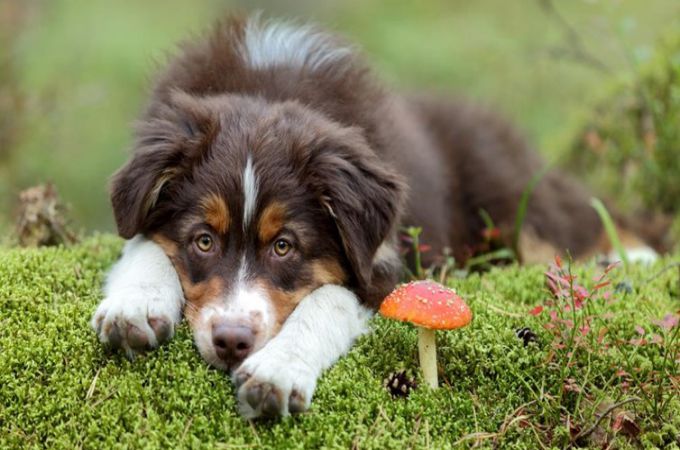In 2015, Dwayne the Rock Johnson’s dog died of mushroom poisoning, and he left a very serious message on Instagram.

It read:
The mushroom that my dog ingested happened to have a lethal toxin that rapidly destroyed my dog’s immune system and liver to the point of no return. I urge all of you to be careful of mushrooms in your back yard, or anywhere else that your dogs go to play. What may look innocent can, in fact, be quite deadly.
As humans, we absolutely love mushrooms because they come with a wealth of benefits, but are they safe for dogs?
Reading the statement above, you may be tempted to think that mushrooms are not safe for dogs, but that is not the case.
Mushrooms are safe for dogs, but there is a very big BUT.
ONLY certain types of mushrooms are safe.
The safest kind are the ones you buy from the grocery store, these are harmless since they are the ones humans consume as well.
Nutritional value of mushrooms

Things such as fungus, mushrooms and such types of fruits have great nutritional contents for both humans and dogs. Below are some of the nutrients found in mushrooms.
Vitamin Bs – They contain water-soluble vitamins that are in fact co-factors in cell metabolism. These are: Vitamin B12, B3. B5, B6, B9, B5, B7, B2, and B1.
Vitamin D – This is a fat-soluble vitamin that is efficient in balancing the phosphorus levels and it also regulates the calcium in your dog’s body. It also helps with nerve and muscle control, and with bone formation.
Protein – Building and repairing skin cells, growing new hair, and muscle tissues are some of the important functions of proteins in our bodies. Other functions include providing energy for all the daily activities, creating hormones, fortifying the immune system, and also creating enzymes that regulate the body functions. All this happens to your dog as well.
Vitamin C – We all know how important vitamin C is. It is used to boost the immune system especially in canines, and also it is an anti-carcinogen agent that helps in fighting cancer. Vitamin C also helps to fight viral skin infections, polio, and distemper. It may also help to stop a kennel cough, respiratory infections, abscesses, and bacterial infections as well.
Riboflavin – This is a co-enzyme that is water soluble and it is mostly responsible for amino acids catabolism, maintains the cell’s energy and also produces energy from fats.
Manganese – This is an extremely essential nutrient that makes use of proteins and carbohydrates effectively. It also helps with your dog’s reproductive health. Now, abnormalities, weak growth, and reproductive failure in the skeletal system are mostly due to a lack of manganese in the body.
Antioxidants – May be helpful in promoting cancer prevention in dogs. They also help to improve your dog’s immune system and prevent skin problems and coat allergy. They are great to dog breeds that have been known to be prone to cancer.
Vitamin A – Dogs with eyesight problems can greatly benefit from Vitamin A. If your dog also licks and keeps scratching his fur, or has dull eyes, then, they have a vitamin A deficiency. A good intake of vitamin A on a daily basis will help prevent such problems.
Dietary fiber: This is extremely beneficial in metabolizing food nutrients.
Selenium – This helps to prevent skin problems, heart disease, arthritis and also prevents cancer in dogs.
Iron – This is a mineral that helps in the prevention of anemia. Most canines suffer from anemia once their bone marrows have few red blood cells. This mineral helps in the production of red blood cells in your dog.
Phosphorus – This mineral is extremely vital for bone development.
All of the above nutrients as noted are extremely beneficial to your dog but in small quantities. Too much and they can become toxic. Vitamins A, C, and D are extremely toxic when there is too much in the dog’s body.
Moderate your dog’s intake of nutrients so they can be beneficial to their bodies.
Which mushrooms are bad for your dog?

Now, as noted above, mushrooms can be good and bad.
Some mushrooms should not even be consumed by humans; here are some classifications of mushrooms.
Mushrooms that are poisonous and can cause gastrointestinal distress effects such as:
- Entolomo
- Chlorophyllum
- Boletus.
False morel mushrooms:
- Mushrooms found in the Verpa genre
- Gyromitra esculenta this is the Beefsteak
- Mushrooms found in the Helvella genre
- Gyromitra caroliniana.
Mushrooms that can cause liver damage:
- Lepiota (False Parasol)
- Galerina
- Amanita phalloides this is the Death Cap Mushroom
- Amanita ocreata this one is called the Angel of Death.
Mushrooms that can cause hallucinations in dogs:
- Psilocybe
- Conocybe
- Panaeolus
- Gymnopilus.
Mushrooms that are poisonous and also have muscarinic agents:
- Clitocybe
- Inocybe
- Toadstool type Mushrooms
- Amanita muscaria also known as Fly Agaric
- Amanita pantherina also known as Panther Cap.
Final say on feeding dogs mushrooms

Always exercise caution with mushrooms both for you and your pets as well, because as noted above mushroom poisoning will lead to death in most cases.
However, do not be too afraid because you also consume mushrooms regularly and they have never harmed you. If you are keen about the type of mushroom that goes into your pet’s mouth then, you have nothing to fear.

